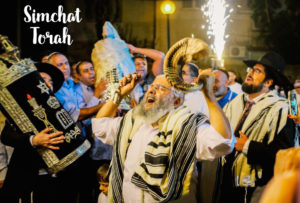The jubilant Feast of Sukkot (Tabernacles) has come to its annual close. I hope, like me, you were able enjoy the sweet seclusion of tabernacling with the Lord last week. The fragrance of His fellowship in our modest outdoor booth still lingers in my heart—and I don’t want it to end.
Shemini Atzeret: October 1, 2018
Apparently, God is not eager for it to end, either. For when Sukkot’s week long festivities and sacrifices are over and done, He gives us one more day, just to linger with Him: “For seven days present offerings by fire to the Lord; on the eighth day hold a sacred assembly and present an offering by fire to the Lord. It is a solemn assembly; do no regular work.” (Leviticus 23:36, see also Numbers 29:35)
The eighth day (Tishri 22) after Sukkot begins is set apart “merely” to “be” with the Lord. It is a Sabbath. No extraordinary rituals on our part are required. We are told merely to hold a solemn or sacred assembly, presenting only the most basic fellowship offering. This solemn assembly is known as Shemini Atzeret, meaning literally, “Eighth [Day] Solemn Assembly.” The word “atzeret” comes from a Hebrew root meaning to hold back or tarry. Based partly on this root definition and other grammatical aspects of Leviticus 23:36, the rabbis have interpreted Shemini Atzeret as a lingering time with the Lord. It is a type of Sukkot afterglow.
Some rabbinic traditions attribute additional significance to Shemini Atzeret.They regard Sukkot as the feast on which Israel sacrificed to God mostly on behalf of the nations. (This is because God commanded Israel to sacrifice 70 bulls on Sukkot and they interpret 70 as representing the nations. Moreover, Zechariah 14 directly associates Sukkot with the nations.) So after seven days of busily offering priestly sacrifice for others, Shemini Atzeret marks an occasion of private, family-like intimacy between God and His people.
As you probably know, Sukkot likely foreshadows the Lord’s dwelling with His people in the Messianic Millennial Age to come. Now, as gloriously resplendent as that age will be, it is not the climactic end to our union with God. A still greater, infinite glory awaits His people.
Recall that in Scripture, the number 8 often represents new beginnings. Accordingly, the Feast of Shemini Atzeret on Day 8 could well represent our continued fellowship with the Lord after the Messianic Millennial Age, fulfilled in the new heaven and earth.In that case, Shemini Atzeret seems to prophetically foreshadow our joyful lingering in the presence of Adonai forever.”Then I saw a new heaven and a new earth, for the first heaven and earth had passed away…I saw the holy city, the new Jerusalem, coming down out of heaven from God, prepared as a bride beautifully dressed for her husband. And I heard a loud voice from the throne saying, “Look! God’s dwelling place is now among the people and He will dwell with them. They will be His people and God Himself will be with them and be their God.” (Revelation21:1-3) Hallelujah!
Simchat Torah: October 2, 2018
In Israel, Shemini Atzeret is officially combined with the holiday of Simchat Torah (Joy of the Torah) on Tishri 22. Outside of Israel the day is observed on Tishri 23, one day after Shemini Atzeret.
Simchat Torah is a rabbinic based and extrabiblical holiday. But it is not intrinsically nonbiblical. Traditionally, the focus is on the happy completion of our annual reading of the Torah—and immediate restart of the next year’s reading cycle. To express joy for God’s Word, there is festive singing and dancing with Torah scrolls in hand.
Simchat Torah can be observed in a worshipful, Yeshua centered way, expressing gratitude for the immeasurable gift of the Word of YHVH. “Oh, how I love Your law…Your commands make me wiser than my enemies…My lips overflow with praise for You teach me Your decrees.” (Psalm 119:97, 98, 171) “Do not think I have come to destroy the law…but to fulfill it.” (Matthew 5:17)
However you observe Shemini Atzeret and Simchat Torah, may your joy in the Lord be full and rich.

